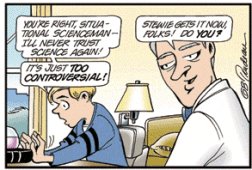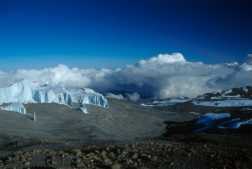The Scientific Nature of Critical Thinking

The basic nature of critical thinking causes an individual who is engaged in his or her own life to use scientific principles of research to determine if an idea is fact or fiction. But for the many today who have been brainwashed by church and political leaders to believe that most science is just a “theory,” critical thinking will not come easily. In fact, it is not uncommon for me to hear students say things like, “all ideas have equal merit,” or, “the truth can’t be determined.”
That this attitude represents a major impediment to the safety and future of our own society is evidenced by the fact a wingnut from Australia, Ken Ham, can travel across the U.S. and earn $120,000 a year by giving pep talks about Creationism to elementary students and other captive audiences, the theme of which is that because no one was there but Adam and Eve and God, no one can dispute the Biblical version about the origins of the earth. (Just imagine what this line of reasoning would do to the criminal justice system.) Believing in Creation to the exclusion of all scientific understanding of the origins of the earth is in itself not dangerous. But the anti-science bias that it implies is.
I was reminded of this not-so-new anti-science bias, in of all places, the Sunday funnies this week. Doonesbury, ever the scourge of uncritical thinkers, devoted six color panels to the so-called “controversial” nature of science. In his sly, sarcastic way, Gary Trudeau depicted the hypocrisy of those who for their own agendas diminish the value of science in pursuit of their own ideologies by trying to claim that the great scientific issues of today, such as global warming, farm chemical poisoning of our water supplies, the Vietnam related Agent Orange link to cancer, acid rain, and tobacco’s link to cancer, to name a few, are merely “controversies” in which one theory is as good as another. In short, some people would have you think that evolution is “just a theory,” as if that would make it go away.
Let’s all remember that when Galileo and Copernicus in the 15th century used scientific principles to show the earth orbited the sun, the religious wingnuts of the time excommunicated Galileo and burned his colleague, Giordano Bruno, at the stake under the pretext that such blasphemy was “just a theory.” You know, a “theory,” sort of like the “theory of gravity.” (Easily tested by stepping off your second floor balcony.)
The same, of course, holds true for politics. By stressing rhetoric over research, paid pundits in the broadcast media and on the Internet would have you think that the war in Iraq is a good deal (for whom no one is saying any more) and that the press is only exaggerating the bad news as part of their persistent “Bush bashing.” However, if you know how to do the research, you can see for yourself the grim facts that tell the real story in Iraq. And you can read for yourself analytical pieces in highly respected, non-partisan foreign policy journals, such as the current issue of Foreign Affairs, that paint a picture of foreseen and continued folly. Retreating glacier on Mt. Kilamanjaro - photo by Mark Bowen
Retreating glacier on Mt. Kilamanjaro - photo by Mark Bowen
Science has become politicalized, of course, because there are very huge dollars at stake. Big Oil, for example, has a vested interested in claiming that global warming is “only a theory,” a controversial one at that. In the scientific and university community, though, there is no controversy at all. Years of meticulous scientific research, outlined in great detail in such very readable books as Dr. Mark bowen's Thin Ice, put the controversy behind us and place the verdict directly on the greenhouse effect, largely created by the burning of fossil fuels.
There is a reason why all first-tier colleges require several semesters of science, even if one is not going to be a science major. Understanding the principles of research, collection and checking and comparison of data over many years and in many places, is fundamental to being an informed citizen in today’s society. Such citizens are equipped to take control of their own lives and make decisions that protect their own self-interests as well as those of the broader society. In my own view, we are in serous danger of becoming a second-rate nation is this assault on science and research continues much longer. The rest of the world will leave us in the dust, literally.


